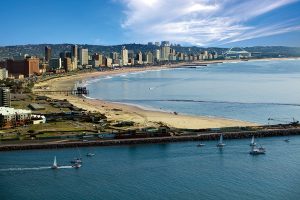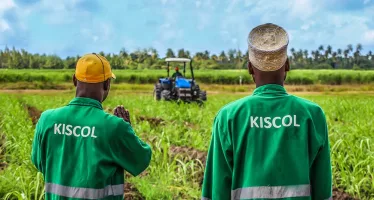Invest Durban: ‘First-Stop-Shop’ to Stimulate Growth in South African Metropolis

South Africa: Durban
Invest Durban was an initiative recommended by the Durban City Council and private businesses as the “first-stop-shop” to stimulate new investment in the South African metropolis.
It acts as a link between the council and the private business sector, offering a free investor-advisory service as well as promotion, facilitation, and aftercare services for all investment stakeholders.
Investor support encompasses a four-part business mandate: investment promotion and marketing; foreign investment identification, attraction and facilitation and FDI aftercare and expansion.
Invest Durban works with organisations such as the Department of Trade and Industry, Invest SA, Trade and Investment KZN (TIKZN), the Durban Chamber of Commerce and Industry, the KZN Growth Coalition, and State-Owned Enterprises such as Dube TradePort, the DBSA, IDC, ACSA and others.
The thrust of Durban’s proposition to attract investors can be put into three broad categories:
- Premium destination: a business and lifestyle environment most conducive to profitable, sustainable investments, with ample land available.
- Catalytic Projects: initiatives with the potential to shift the socio-economic landscape and trigger a series of investments across several sectors.
- Priority Sectors: areas attracting planners in various ways, including the creation of clusters and the development of value chains to promote new ventures and investment opportunities.
Durban is working on a number of large-scale projects with the potential to make a regional impact. The location of these projects is vital. They must either be on national trade routes or should help to break down the old apartheid living/working dynamics. Projects are selected for their scale in terms of job creation, investment size and potential revenue creation. Ideally, the projects should include a combination of uses (retail, commercial and housing, for example) and they should fit in with the United Nation’s Sustainable Development Goals.
The Point Waterfront Development, for instance, an ambitious plan linking the city’s beach promenade and the harbour, fits into the category of a catalytic project. Projections put the potential investment value at R40bn (£2.3bn), with the creation of 6,750 jobs.
Property use for the development offers a mix of office space, retail, residential and leisure options. The 55-ha site has already seen significant investment. A new cruise line terminal in the harbour, backing on to the Point, will dovetail well with the new precinct’s atmosphere.
Other major projects include:
- GO!Durban Transport Oriented Development, which has received major road upgrades and will facilitate trade;
- Centrum Government Precinct which would formalise the relationship between buildings such as the International Convention Centre (and extensions) and a related hotel, the library, council chambers and the redevelopment of Gugu Dlamini Park;
- Cornubia integrated human settlement development north of Durban, on 1,300 ha, a partnership between Tongaat Hulett Development, the human settlement departments at national and provincial level, and eThekwini municipality
- Dube TradePort, the multi-modal facility at King Shaka International Airport.
Cluster Initiatives
Durban has a diverse economic landscape, including some large-scale enterprises. Co-operation between the public and private sectors is formalised by cluster initiatives which draw experience and expertise from commerce and industry, labour organisations, government and academia.
Under manufacturing, the following clusters or programmes are active:
- KZN Clothing and Textile Cluster (KZN CTC)
- Durban Automotive Cluster (DAC)
- Durban Chemical Cluster (DCC)
- eThekwini Maritime Cluster (EMC)
- KZN Furniture Incubator
- Agro-processing development programmes
Research in how best to grow particular economic sectors is on-going, and in-depth discussions are being held about how to develop and grow value chains. The resources of the KwaZulu-Natal province are mostly consumed or exported in their raw state; more could be done to add value through processing.
The priority sectors are:
- Automotive and allied industries
- Logistics and logistics management
- ICT and BPS (IT and communications) and Business Process Services
- Agri-processing
- Life sciences (pharmaceuticals, medical device manufacturing, and Health Facilities)
- Tourism asset development
Some of these initiatives play to the existing strengths of the regional economy, some seek to exploit newer avenues with the emphasis on the environment. A variety of projects link tourism, renewable energy generation, recycling and job creation.
There are various programmes with their own goals and positive spin-offs for targeted sectors. These include the drive to increase local content, boosting metal fabrication across sectors; the promotion of black industrialists, promoting exports; and the over-arching eThekwini Industrial Development Policy Action Plan.
You may have an interest in also reading…
La Trobe Financial: On Top Down Under
Australia’s leading credit asset manager is committed to retaining and honouring the trust it has won from investors. With over
No Sugar Coating for Kenya’s Cane Industry, but KISCOL has an Established Place in Industry
Increased competition and dwindling natural materials challenge some producers, but KISCOL is growing, diversifying, and ‘doing things right’… Kwale International
Level Heads, Strong Ethics, Transparency: DPM Finanzas Aims for Leadership of the IFA Sector
‘Being properly advised is not a guarantee of success — but it reduces the likelihood of failure…’ DPM Finanzas, founded


















































































